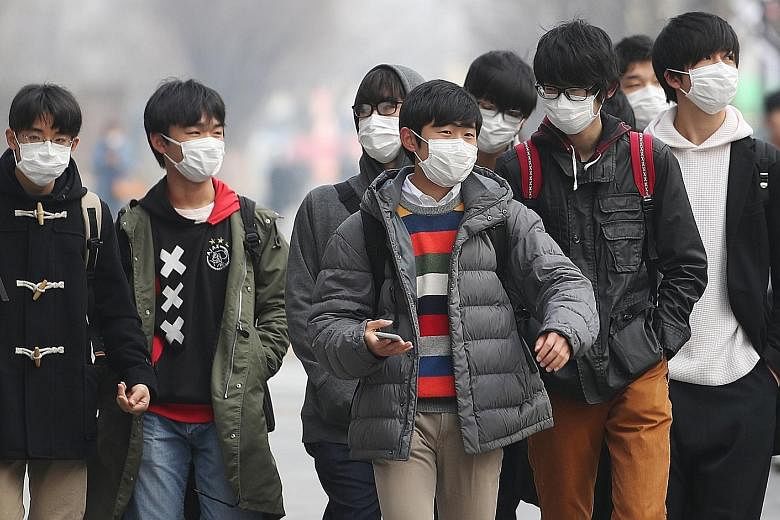SEOUL • A hazardous smog has engulfed the capital periodically for weeks, pushing South Korea into the top ranks of the world's most polluted countries.
The government has issued 85 ultra-fine dust warnings, more than twice the 41 advisories issued in the same period last year.
Classified as a first-degree carcinogen by the World Health Organisation, the PM2.5 nanoparticles penetrate deep into the human respiratory system and can trigger a variety of illnesses.
The sale of portable pollution monitors, clothes dryers, face masks and air purifiers has soared in recent weeks, reported local media.
E-mart announced that sales of air purifiers last week rose by 86 per cent year-on-year, while electronics retailer Lotte Hi-mart said last month's sales of dryers soared elevenfold year-on-year, reported The Korea Times.
Some parents are even keeping their children at home to avoid the poor-quality air.
"When it gets really bad, I choose not to send my kids to kindergarten or nursery, especially when there's an outdoor activity planned for that day," Ms Lim Hye Young, 44, told Yonhap news agency. She has two children, aged seven and four.
Ms Jang Hyo Joo, 33, who has a 13-month-old daughter, recently spent some 700,000 won (S$875) on a high-end air purifier. They live in Hanam, south of Seoul.
"There's no way I'd take her outside and let her breathe the terrible air, unless the weather gets better," Ms Jang told Yonhap.
Last week, the daily pollution rankings in Seoul spiked to the third highest in the world, after New Delhi and Dhaka. Seoul's Air Quality Index (AQI) level hit 174 on March 20, a record surpassed by the city of Pyeongtaek in Gyeonggi province yesterday.
Pyeongtaek's AQI level reached a high of 178 as of 6pm local time, according to real-time air quality monitoring website AirVisual, which monitors around 5,000 cities worldwide. An AQI above 100 is deemed unhealthy for sensitive groups.
Seoul was not the only city affected by the pollution. Large areas across the country have also been covered by fine dust particles for prolonged periods since March 17.
South Korea has been grappling with worsening air quality every year. During the spring months - from March to May - annual sandstorms blowing in from China turn the skies yellow.
The government has pinned the blame mainly on China, releasing data showing that over 80 per cent of fine dust originates there.
But there is growing concern that much of the root cause of the toxic air - estimated to cost the country up to US$9 billion (S$12.6 billion) each year - lies at home, reported the Financial Times.
Economics professor Kim Jeong In said that while the problem originates in both South Korea and China, the South Korean government should replace old coal power plants with natural gas ones, as well as encourage consumers to replace diesel cars with green vehicles.
"Korea should also suggest to China that the two countries jointly research air pollution and share open data on fine particles," Prof Kim told The Korea Herald. "That way, we can pressure China to pay for its own production of the fine dust."
A report published on Thursday in the peer-reviewed international journal Nature said that about 30,900 people in Korea and Japan die prematurely every year owing to fine dust from China.
The study was jointly conducted by researchers from China's Tsinghua and Peking universities, as well as the University of British Columbia in Canada and the University of California, Irvine in the US.

